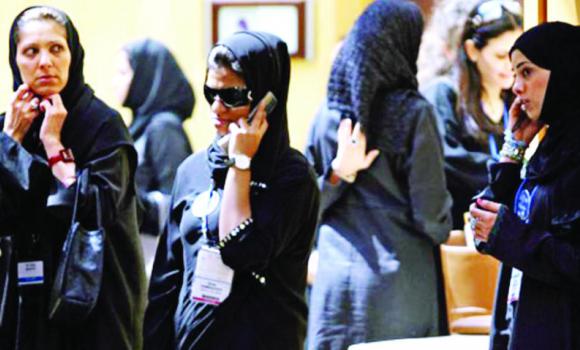
Jeddah, Sep 1: The recent ministerial decision that prohibits daughters of expatriate workers to transfer their sponsorship from their guardian to their employer and the decision that disallows them to work at all has sparked disagreement among expat families and working daughters in the Kingdom.
Shabal Amri, a Jordanian national working at Al-Rajhi Bank in Jeddah, says that there is no way the Kingdom can put away working female expats and get Saudis to take over. “For example, Saudi staff at female branches of banks are for the most part unable to help expat English-speaking customers simply because they are not bilingual. At this point, they expect us expats to provide help.”
Amri suggests that the Ministry of Labor needs to consider this decision because it will inevitably result in expat working daughters living in the Kingdom going back to their home countries to seek employment.
Many institutions, especially international schools that used to hire youth as substitute teachers, will suffer from this recent ministerial decision.
“I think the ministry should revisit this decision,” says Naila Haq, vice-principal at a girls’ school in Dammam and mother of a female MBA graduate who is currently seeking employment in the Kingdom. “Otherwise there won’t have been any use educating our daughters. If the government is seeking to tackle unemployment problems among Saudi youth, I can safely predict that this decision is not going to make things right or fill the gaps they hope to fill.”
Haq says that expat daughters are not studying so that they can stay at home after completing their studies. “They need to be given opportunities in this country too. After being born and bred in Saudi Arabia, it is completely unfair to send them back to their countries to seek employment.”
“Several international schools will also face a big loss because of this decision to disallow expatriate daughters to work,” says Haq. “Many applications we receive for interviews are mostly expat wives or daughters that are living in the kingdom. This decision may upset a lot of expatriates in the Kingdom.”
“I applauded the decision by King Abdullah to grant all expats more time to correct their status once the initial deadline was up in July,” says Qurratulain Ashfaq, account manager at a digital ad agency in Jeddah. “However, the recent news has come as a shock and has left me extremely disappointed. This country and its ever-changing laws just keep affirming the belief that I have held for quite some time now, which is that I have been raised in an extremely sexist country.”
Ashfaq says that it makes absolutely no sense to that she should stay at home while her brother goes out for work, calling it “sexism.”
“Am I supposed to sit at home now? Is the ministry going to give me my monthly allowance?” asks Ashfaq. “At the age of 24, I am no longer a child who has to be financially dependent on her parents. I have a right to earn my own living.”
Ashfaq adds that since she heard about this decision, she has been under a lot of stress. “I can foresee a bleak future ahead of me. I am not the kind of girl who can sit at home and do nothing. I am young and educated and I like to work hard and earn a living to support my and my family. Yet it seems I will be losing my job soon, thanks to the Ministry of Labor.”





Comments
Add new comment